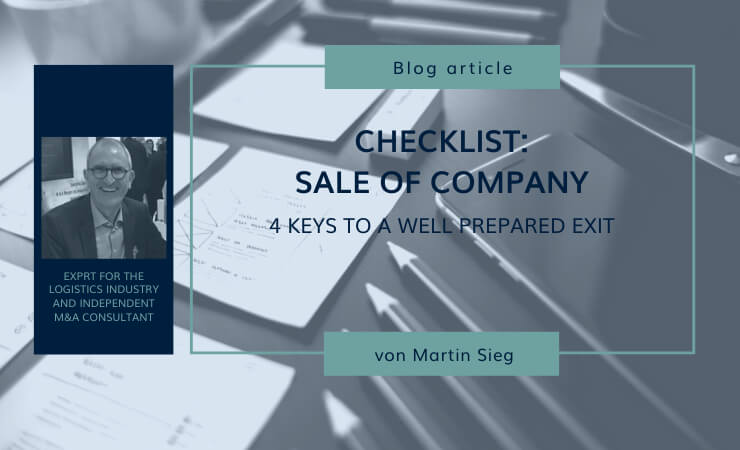What you should consider, compile and determine beforehand
Nobody makes the decision to sell a company easy. But once it has been made, good preparation is the be-all and end-all for an efficient sales process within a time frame that is as predictable as possible – and also for the ultimate sales success. There are four decisive points that help to assess the preparation effort and to structure it sensibly.
1. Reflect on the essentials in advance
Even if the decision for a company sale has already been made, there are still some things that you as the owner should reflect well.
Creating clarity
This also includes creating clarity about one’s own future after the sale. Because with your company you also let go of your accustomed life. Also ask yourself whether you can cope with a lengthy sales process that can be accompanied by tough discussions and tough negotiations. After all, the sales process can take up to 18 months – can your company withstand it?
Communication with employees
It is also essential to carefully consider how you will communicate with your key personnel about the planned sale of the company. What reasons do you want and what do you have to disclose? Who can and who must and do you already include in the preparations? Remember that you will need the help of a few employees to compile all the necessary facts and figures. And especially important executives should be kept close to you and your company during the sales process.
2. Compile facts and figures
Key figures about the company, information about customers and current contracts, information about your employees: All this information must be compiled before the first contact with potential buyers. You will need a lot of this for your first teaser and a more detailed exposé. On the other hand, the parameters are indispensable for determining a realistic sales price.
Information about the company
The earnings figures for the last five years up to the current point in time must be available in a transparent manner. Also the operative figures, such as quantities, trade lanes, product split and export import shares. Already now you should compile all foundation documents as well as purchase or lease agreements for land, buildings and other immovable goods. Also important: the creation of a complete customer list – all current orders must also be collected. The order overview is required by every prospective buyer for the due diligence, the economic, tax and legal review of your company.
Information about the personnel
Of course, your employees also play a central role in the sale of your company. First, you should draw up a current organizational chart of your workforce: Who works in which position and with which core tasks in which department. In the next step, you need precise information about your employees: training, qualifications – and also expertise and suitability for management tasks. In addition to current salaries, it is also important to include other information in the employment contracts, such as bonus models, company vehicles and company pension schemes.
3. Determine the purchase price
Of course this is difficult, but when determining the sales price to be achieved, you should proceed as emotionlessly as possible: Here only verifiable facts count in order to obtain a realistic value.
Critically question
You should critically compare the profitability and position of your company with the market and competitors in the industry. Also, not only the actual number, but also the condition and value of the existing operating and business equipment, technology, plant, vehicles and other essential goods should be carefully considered. For the evaluation of the order volume, in addition to type and scope, the value and creditworthiness guarantee for current orders and the degree of customer loyalty must also be taken into account. Also consider: Which business could be threatened by a company sale?
Take liabilities into account
On the other hand, liabilities of all kinds are also indispensable for calculating the value of the company: tax liabilities and payment obligations to suppliers and banks, including all bank agreements such as loan agreements – and including any credit lines, monthly interest charges and consideration of any guarantees or subsidies that have to be repaid.
4. Considerations regarding buyers and agreements
Targeting potential buyers
If you imagine that by selling a company you are handing over your life’s work and the responsibility for your employees – which kind of buyer would you consider the right one? What are relevant exclusion criteria? Consider also your customer base, the relationship to contractors and partners as well as the market. Which buyer or investor groups fit and which don’t?
Planning agreements
Clear agreements and explanations are already required for the first discussions with interested parties: In particular, a non-disclosure agreement (NDA) is of the utmost importance. What should it contain, what operating information must it include? It makes sense to consider carefully at this stage whether there is any information that can only be passed on to a buyer when the contract is signed: This includes trade secrets such as the functionality and technology of certain innovations.
Support in the sale of a company
Surely this checklist cannot clarify all questions around the planning of a company sale. I will be happy to answer them personally and will also be at your disposal for a non-binding consultation – please contact me.


